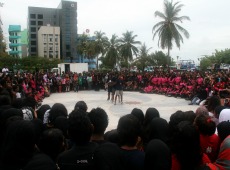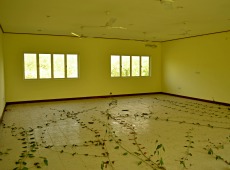The Dhivehi Rayyithunge Party (DRP) and Maldivian Democratic Party (MDP) agree income inequalities are being fueled by vested interests, faulty government policies and a lack of educational training opportunities for youth.
President Dr Mohamed Waheed Hassan Manik recently commented on the growing nationwide income disparity despite revenues doubling in the Maldives over the last decade, during a speech on Kan’ditheemu island in Miladhummadulu (Shaviyani) Atoll.
“The provision of incentives for the poor, and boosting their living standards to a certain minimum, are some of the efforts that could be undertaken,” Waheed said.
However the DRP and MDP have agreed that the government is grossly out of touch with the systemic problems fueling inequality in the Maldives.
“The political elite lead privileged lives and have no idea what is going on here. Many people like [President] Waheed have spent all their time overseas, which explains why public servants are primarily children of privilege with no life experience,” MDP Spokesperson MP Hamid Abdul Ghafoor told Minivan News.
“No one talks about this because they want to maintain the status quo,” he added.
DRP Deputy Leader and Spokesperson Ibrahim Shareef agreed.
“Politicians are blind to the realities of life because of political polarisation. There is no trust, everyone just shifts blame around,” he told Minivan News.
“People in a position to create change must work hard to achieve that change or problems pile up. What President Waheed is saying is one thing – he may be sincere – but let us see if it is different from what he is doing,” Shareef added.
Ghafoor and Shareef both highlighted that work and educational opportunities are very limited and still centralised in Male’. The disproportionate reliance on an inequitable tourism sector creates further income disparities.
“Government has not done enough”: DRP
Shareef told Minivan News the government has not done enough to correct these issues.
The “best and brightest” are forced to leave their islands and settle in Male’ or the resorts primarily located in the atolls surrounding the capital, while the “rich get richer and the poor get poorer”.
“Government policies and vested interests continue to widen the [income] gap that has been created between ‘haves’ and ‘have nots’ over the years, and marginalised development.
“Competing with those [privileged] people is impossible unless we form capable structures conducive to equitable development, open ourselves for broad sections of society to participate in the workforce, and enact policies that redistribute wealth,” Shareef stated.
Shareef also discussed problems that have arisen from high economic dependency on the tourism sector, which was structured inequitably during the 30-year administration of former President Maumoon Abdul Gayoom.
“Gayoom restricted the tourism sector by only allowing ‘certain families’ and allies to build resorts,” Shareef explained.
“Now Maldivians with the capability and vision to build resorts are rarely provided the license or access to investment capital needed,” he added.
Shareef said more resorts targeted toward the “middle market” are needed, in addition to anti-monopoly laws.
He also believes that the education system does not properly prepare youth for the service based economy, and is instead geared toward servicing the government.
Shareef emphasised that this shortcoming has created a huge economic problem whereby over 100.000 expatriates dominate the workforce, particularly among managerial, accounting, and clerical positions in resorts.
“There is something really wrong with the education system. We have very bright and capable youth, but 67 percent still fail O’Level exams,” he said.
“Thus, there are between 30,000 and 40,000 youth without jobs, however they think they are highly-educated so they do not take ‘menial’ jobs, preferring unemployment,” he said.
Shareef said there was an urgent need to reforming the education system to provide vocational training and raising awareness among youth that learning such skills was dignified.
“If youth are not willing, capable, or trained then the income gap widens. They just stay home loitering, spitting on and abusing passers-by.
“Meanwhile, we import labourers to do everything. This is a huge waste of human resources,” Shareef stated, calling for a ‘master plan’ to tackle the country’s social problems.
“Lack of awareness permits slave labour”: MDP
Ghafoor echoed Shareef’s remarks. He told Minivan News that the growing income inequalities are symptomatic of centralised, inequitable resource allocation – particularly in the tourism sector – as well as the lack of skills training for youth within the education system.
“The political right requires the status quo be maintained, which narrows the tourism base, and keeps the poor poor,” Ghafoor said.
“They take advantage of the lack of awareness [among youth and foreign workers], essentially creating conditions of slave labor,” he added.
Ghafoor explained how the educational skills training vacuum for Maldivian youth leads to a dependency on foreign labourers.
“At present there is a dependency on imported labour. Foreign workers – especially Bangladeshis – work under terrible conditions, for cheap, and this has led to a dramatic increase in human trafficking and human rights abuses.”
Ghafoor emphasised the serious resource allocation problem within government policies which compels youth to relocate to Male’ for employment, or seek resort work.
“The young husbands and wives who do find work at resorts are separated from their families for prolonged periods of time. Where else would employees ‘sleep on the shop floor’ and not be able to return to their families at the end of an eight hour work day? This is really impacting the social fabric of the Maldives,” Ghafoor added.
The MDP had many ideas to correct the income disparities fueled by geographic distance, particularly regarding the tourism sector, Ghafoor said.
“The MDP has a plan for radically changing the tourism approach by focusing on providing adequate compensation through a national minimum wage, locations on or closer to inhabited islands, and protecting workers rights.”
Ghafoor emphasised the need for protecting workers rights as a means to not only reduce income inequalities, but also reduce human trafficking – an issue, he said, that has only been discussed openly in the past three years.
“Proper governance, including the integration of International Labour Organisation (ILO) standards into legislation is essential, as is the development of the Tourism Employees Association of the Maldives (TEAM),” he added.
Developing guesthouses on islands “where the average family can profit” was another option for decentralising the tourism sector and creating jobs on local islands.
Likes (1)Dislikes
(1)Dislikes (0)
(0)  Aneesa said that the event was aimed towards the younger generation in the Maldives as they do not possess the “prejudices” elderly people have in regard to equality.
Aneesa said that the event was aimed towards the younger generation in the Maldives as they do not possess the “prejudices” elderly people have in regard to equality.
